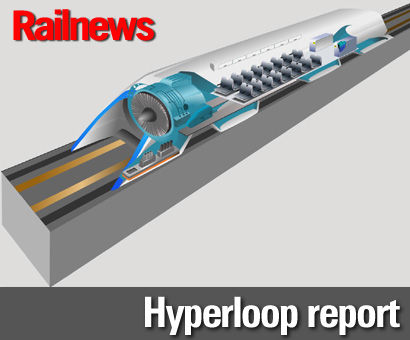A REPORT from the Science Advisory Council has concluded that a 1,000km/h Hyperloop network is feasible in this country, ‘although an operational Hyperloop system is likely to be at least a couple of decades away’.
Hyperloop was first proposed in 2013 by the American entrepreneur Elon Musk, when he outlined a tube-based system where pods transported passengers or freight at very high speeds in a low friction environment.
Since then, the prospect has intrigued a number of potential developers, who are currently working on commercial versions.
One such organisation, Hyperloop One, delivered a presentation to the SAC. However, the Committee said its report concentrates on the general concept rather than any individual proposal.
Hyperloop systems are intended to operate at very high speeds, with short headways of as little as 10 seconds between pods travelling at up to 1,000km/h in a sealed, low pressure tube. The Committee warned that this ‘introduces a range of risks that will require careful consideration in the design and operation of Hyperloop systems’.
These risks include the implications of emergency braking at very high speeds, power failure, protection from physical and cyber-attack and the protection and evacuation of passengers if a tube or pod became depressurised.
The Committee also concluded that the topology of Britain and its intensive land use could make Hyperloop construction more difficult and costly than in other countries, which could mean that such a line could have to be built partly or completely underground. Extensive tunnelling would add to construction costs and could also have safety implications, such as making evacuating passengers in an emergency more difficult.
One problem will be ‘selling’ the idea to prospective passengers, recalling some public reluctance to travel on the earliest railways in the 1830s or by air in the last century. The committee said: “It will be critical for the success of the systems to demonstrate to passengers that Hyperloop systems will operate with the highest levels of safety and reliability. Similarly it will be important to ensure that passengers do not feel unduly confined within passenger pods and do not experience excessive or uncomfortable g-forces.”
The report added: “The United Kingdom has a significant level of relevant expertise and experience from its strong academic and industry base to support the worldwide development and delivery of Hyperloop systems.” Some ‘proof of concept’ demonstrations are planned over the next twelve months by a number of Hyperloop developers.
Writing in the September 2017 edition of Railnews, Jeremy White, who is director of transport at design agency Seymourpowell, said: “There are some mighty technical issues to contemplate before Hyperloop can be realised, but these will be solved with time and the right investment. The bigger challenge however will be to convince people to choose this mode over more acceptable, conventional, and traditional forms of transport.”


